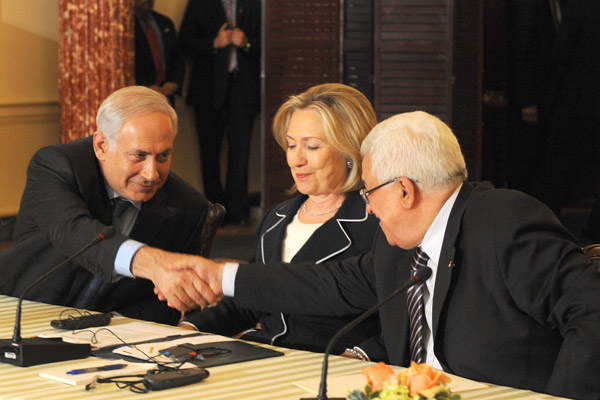The façade of a peace process is an obstacle to achieving a just peace, for which there can be no alternative.

Hillary Clinton believes that the façade of an Israeli-Palestinian peace process is preferable to no peace process at all, we learned this week from the presidential candidate’s private emails, hacked by Russia and published by WikiLeaks.
It’s hard to imagine a more troubling statement about Israel/Palestine from a politician who will in all likelihood be the next president of the United States, even if it represents only part of her thinking on the region.
Let’s examine the logic behind what the former secretary of state meant when she wrote of managing the Israeli-Palestinian conflict that, “[a] Potemkin process is better than nothing.”
The absence of a peace process is what we already have today. It is a reality in which hundreds, sometimes thousands of (mostly Palestinian, but also Israeli) lives are stolen every year. It is a reality in which millions of people live under a foreign military regime and are denied the most basic human and civil rights. It is a reality in which constantly expanding Israeli settlements make the possibility of a sovereign Palestinian state less and less likely with each new home illegally built on Palestinian land. It is intolerable.
Things have gotten worse in the absence of a peace process, which has been the case for the majority of the past decade. But with no process to provide a horizon for change or hope, global demands for change have also increased. That has manifested primarily though international pressure on Israel to end the occupation, ranging from a boycott movement to small steps in the direction of very limited sanctions, like the European Union’s settlement product labels. None of those steps, alone or together, are a game-changer, but they are a strong signal from the world to Israel that it will not tolerate the status quo of occupation.
Alternatively, the façade of a peace process, or a peace process for the sake of the process itself, serves to deflect much of that international pressure on Israel. We saw that happen in real time just a few years ago when the European Union delayed the implementation of settlement product labels because there was a peace process taking place. Similarly, during the same round of peace talks, the Palestinian government was very open about the fact that it was holding off joining international organizations and treaties as long as the process stayed alive. (The first thing the Palestinian government did when the last peace process hit a wall was to join 15 treaties.)
But the façade of a peace process deflects and defangs only the consequences for Israelis. Palestinians, on the other hand, continue living under occupation. Even worse, because an Israeli leadership engaged in peace talks needs to assuage right-wing fears that the façade might give way to an actual peace process, it is often accompanied by gestures to the Right like new settlement construction. And when the façade of a peace process eventually disintegrates, its failure, combined with an utter lack of any political horizon, can help fuel resurgent violence, as we saw in the summer of 2014.
So when American politicians like Hillary Clinton say that the façade of a peace process is better than no process, they mean it is better for the United States and Israel, not for Palestinians. A Potemkin peace process expressly means maintaining the status quo of occupation and oppression while neutralizing any consequences Israel might face for its actions.
Oslo, the [Bill] Clinton parameters, and the entire framework for peacemaking we’ve come to know over the past few decades have all long passed their respective expiration dates. Even if they were still relevant, Israel’s leadership has made clear it will not allow the creation of a sovereign Palestinian state. Instead of going through the same familiar motions, as Hillary Clinton’s email proposes, it is time to start considering alternative political frameworks that can guarantee equality and full rights for Palestinians and Israelis alike.
We should all start strategizing how to nudge Mrs. Clinton toward that realization starting January 20.

